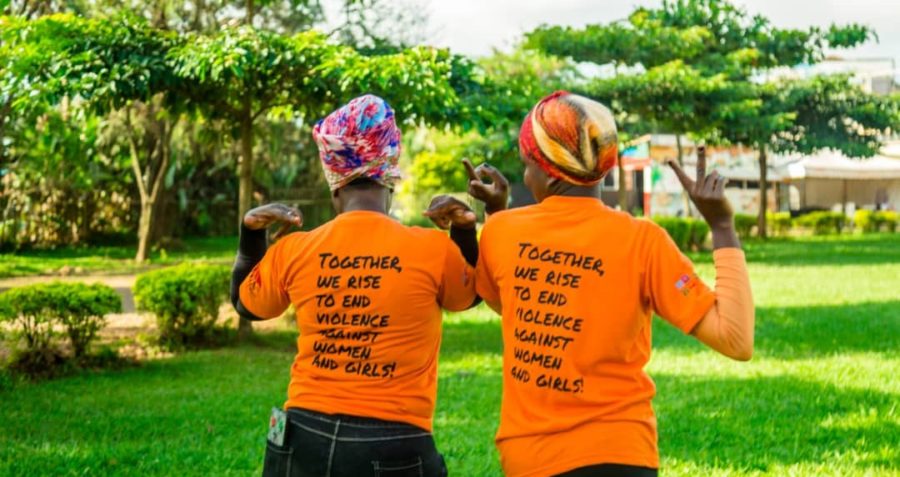Solidarity in action to end gender-based violence
 © ICWEA
© ICWEA
Around the world, women are taking action in an invigorated effort to end gender-based violence. We are supporting communities most affected, to challenge laws and attitudes that fail to protect people from violence and rape.
Gender-based violence is a significant cause of HIV, with AIDS being a leading cause of death for women and girls of reproductive age globally. The impact of laws, policies and society’s often rigid and uncompromising gender norms continue to put women and sexual minorities at risk.
Through the Partnership to Inspire, Transform and Connect the HIV response (PITCH), we are supporting community advocates to demand their rights and speak out against gender-based violence. In the past few months, they have been incredibly busy.
Communities make the difference
In Uganda, the Y+ Beauty Pageant is an annual event focused on reducing HIV-related stigma, where young people living with HIV compete to win the title of Mr or Ms Y+. During the grand finale of the 2019 pageant, the Ugandan Network of Young People held an interactive Café session with different stakeholders – such as service providers, policy makers and community gatekeepers – to advance the rights of women and girls, and all youth, facing stigma, discrimination and violence.
Recently, Eleos-Ukraine inspired religious leaders of different denominations, including the Archbishop of the Orthodox Church in Ukraine, to record a series of videos to support survivors of violence and call for the government and the public sector to tackle the issue in collaboration with faith leadership.
Women who use drugs typically experience very high rates of gender-based violence, including from law enforcement agents. In Nigeria, YouthRise organise popular community football matches with teams of local female police officers and women affected by drug use. They use this activity to bring attention to the unlawful detention of people who use drugs, and to show them love and care instead.
Creating safe spaces
Creating safe spaces for vulnerable and marginalised people to discuss gender-based violence is a critical starting point. Gays and Lesbians of Zimbabwe (GALZ) run workshops for lesbian, gay, bisexual and transgender people (LGBT) where participants are encouraged to play an active role in addressing violence.
They exchange advice on the challenges with: being perceived as a masculine female or feminine male; on how to speak out on intimate partner violence; incidents with law enforcement officials; discrimination in the workplace or in academic institutions by understanding the policies that should be in place to protect them; and their rights under the constitution.
On intimate partner violence, participants are advised group therapy and anger and relationship management sessions could help reduce incidents.
Empowering symbols of unity and resilience
Across nine countries and with around 90 civil society organisations, PITCH brings together different population groups and issues, building coalitions, setting joint agendas, sharing learning, and achieving stronger voices speaking up on what matters.
The red umbrella is synonymous with sex workers and their advocacy against violence and discrimination. In Indonesia, OPSI is taking to the streets to change a legal framework so that it can better stop abuse and support women’s rights, particularly sex workers.
It is a unique partnership between the women’s rights movement and sex worker organisations to campaign together in Indonesia to ‘Prevent violence against women by the law’.
The media as an ally
In Uganda, the International Community of Women Living with HIV (ICWEA) launched their annual campaign ‘Together we rise to end violence against women and girls’ through a press conference with representatives from over 30 media outlets across online, print, radio, and television channels. It urged the government to take action, and brought the issue into people’s homes.
ICWEA is committed to a year-long plan of action with likeminded civil society organisations. In a country where harmful attitudes are fuelling gender-based violence [link to Gracias and Rio article] changing public opinion against accepted gender norms can lead the way to improved rights.
In Zimbabwe, LGBT people are challenging the media’s negative coverage of sexual minorities. GALZ organised a workshop where more than 30 news editors heard testimonies from members of the LGBT community. This garnered coverage in the local newspaper and online edition, showing how bad publicity has resulted in LGBT people being tormented by society.
In Myanmar, Mahamate used social media to advocate against rape, sharing a message on each of the ‘16 Days of Activism Against Gender-Based Violence’. The organisation created a photobooth and encouraged staff from government departments to support the campaign by ‘putting themselves in the frame’ to show solidarity for their campaign.
Advancing women’s rights
It is impossible to ignore gender as a key factor in driving the HIV epidemic when progress to stem the rising numbers of women and girls acquiring HIV is so slow.
People experiencing violence need to know their rights and how to protect themselves, to combat vulnerability and isolation. We focus on empowering adolescent girls and young women, including sex workers and transgender women to realise their human rights and get equal access to HIV and sexual and reproductive health services.
As gender advocates prepare for Beijing +25 – the anniversary of the blueprint to advance women’s rights – we know that it is not yet time to sit back and rest on our laurels.
Roanna van den Oever and Luisa Orza co-ordinate the gender working group in the Partnership to Inspire Transform and Connect the HIV response (PITCH), a strategic partnership between Aidsfonds, Frontline AIDS, and the Dutch Ministry for Foreign Affairs.
Tags
Adolescent girls and young womenGender-based violencePITCHSexual and reproductive health and rights (SRHR)

